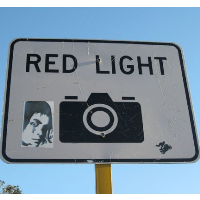California Supreme Court Gives Green Light to Red-Light Cameras

Where would municipal finances in California be without $400+ fines for red-light violations captured by cameras?
That’s a question that need not be answered after the California Supreme Court unanimously upheld use of the system Thursday and denied a plaintiff’s demand that a representative of the manufacturer testify in red-light camera cases about the technology’s reliability.
Carmen Goldsmith’s lawyers argued in her suit (pdf) that information gathered from the automated traffic enforcement system (ATES), i.e. pictures of her zipping through a red light in Inglewood, was inadmissible because no camera company expert testified about its operation and maintenance.
Chief Justice Tani Cantil-Sakauye wasn’t buying that argument.
State law approves of ATES; a law enforcement officer explained what he knew about it in court; and the plaintiff was free to argue the system was flawed, Cantil-Sakauye wrote. That was good enough to fine Goldsmith $436 in March 2009.
If Goldsmith and her lawyer were hoping the court was looking for an excuse to strike down use of the controversial camera system, the justices gave them no reason to feel they had an ally:
“Defendant asks that, in order to restore the public‘s trust in the integrity of the traffic court system, we exercise our inherent powers to ‘regulate criminal procedure’ by requiring ‘proper’ testimony regarding ‘questionable’ ATES photos and data prepared by Redflex before the photos and data may be admitted into evidence. . . . We decline.”
Cities in California were among the first in the nation to use red-light cameras when Oxnard installed them in 1996. But as the cameras have come under increased scrutiny and criticism, cities have been pulling the plug on them.
The Insurance Institute for Highway Safety, a non-profit organization funded by auto insurance companies, says the use of red-light cameras increased steadily since the late 1990s, peaking at 540 in 2012. By the end of 2013, 503 communities were deploying the technology as the number of those bailing on the program exceeded new recruits. Atlanta, Baltimore, Chicago, Denver, New Orleans, New York City, Philadelphia, Phoenix, San Francisco, Seattle and Washington, D.C. are among major cities with the cameras.
Proponents of the system say it acts as a strong deterrent to running red lights, cuts down on traffic accidents and frees up police to perform more important functions.
Its detractors say the system does none of that. Instead, they argue: Almost all the tickets are for rolling stops that endanger no one; motorists surprised by a flashing camera are more likely to cause an accident; police are still tied up in court when the tickets are contested; and car owners are often incorrectly identified as drivers because the camera isn’t positioned to see them.
Twenty-six states have banned or do not have red-light cameras, according to the institute, but cash-strapped cities and counties still see value in the technology. None are more enthusiastic about the financial benefits than those in California, where the ticket is well over $400, four times the average ticket elsewhere in the country.
Modesto police officer Steve Silva, who approves each red-light ticket in his town, told Cyrus Farivar at Ars Technica last year that he knows the tickets are kind of pricey but he doesn’t think about the revenues when reviewing the photographs.
“We’re not trying to go out there and rape the citizens of Modesto for running red lights,” he said. “You don’t want to get a ticket, quit fucking running red lights!”
–Ken Broder
To Learn More:
California Top Court Says Red Light Camera Photos Are Evidence (by Cyrus Farivar, Ars Technica)
State High Court Rejects Challenge to Traffic-Light Camera (by Bob Egelko, San Francisco Chronicle)
Florida City Installs Red-Light Camera in Front of Hospital Emergency Room (by Steve Straehley, AllGov)
Pasadena Turns off Red-Light Cameras that Didn’t Put the City in the Black (by Ken Broder, AllGov California)
The People v. Carmen Goldsmith (California Supreme Court) (pdf)
- Top Stories
- Controversies
- Where is the Money Going?
- California and the Nation
- Appointments and Resignations
- Unusual News
- Latest News
- California Forbids U.S. Immigration Agents from Pretending to be Police
- California Lawmakers Urged to Strip “Self-Dealing” Tax Board of Its Duties
- Big Oil’s Grip on California
- Santa Cruz Police See Homeland Security Betrayal in Use of Gang Roundup as Cover for Immigration Raid
- Oil Companies Face Deadline to Stop Polluting California Groundwater





